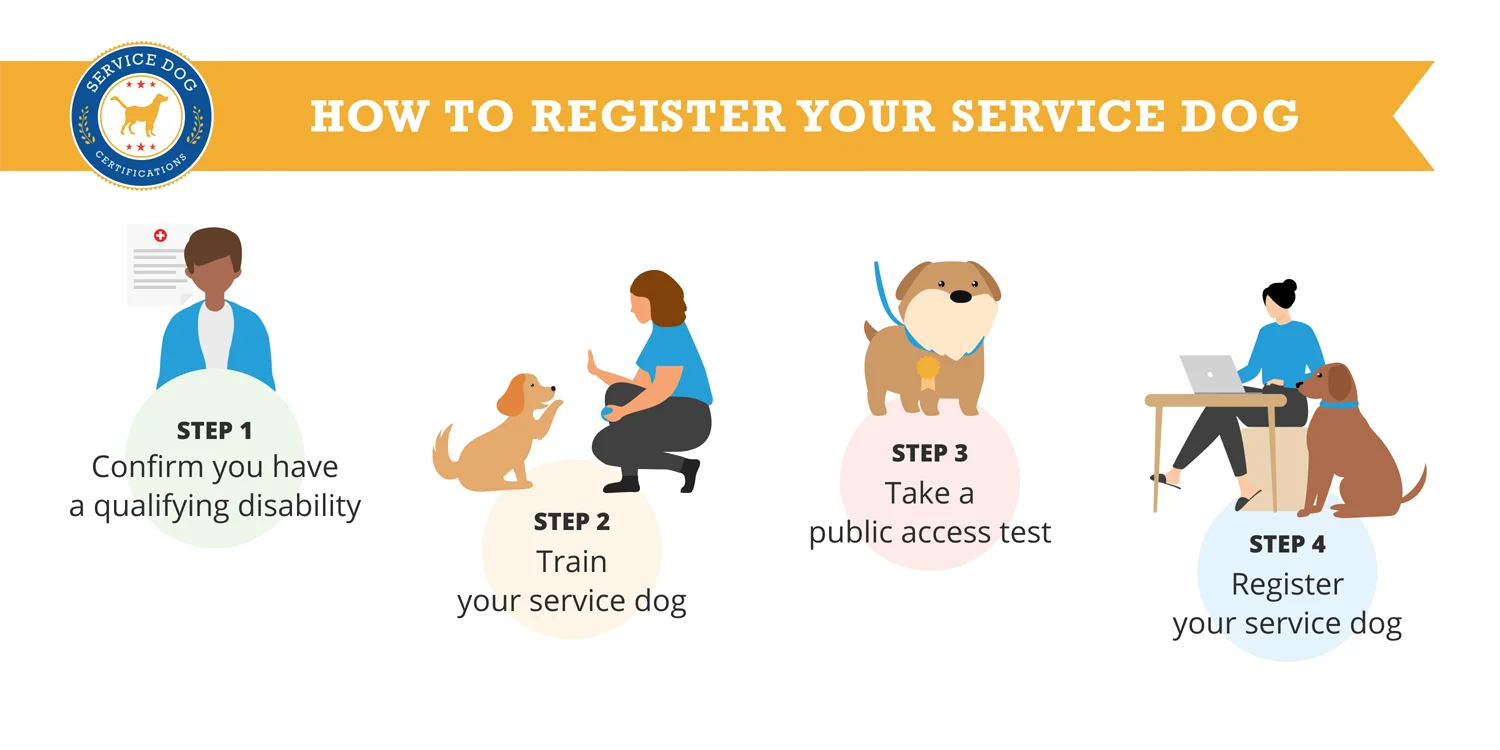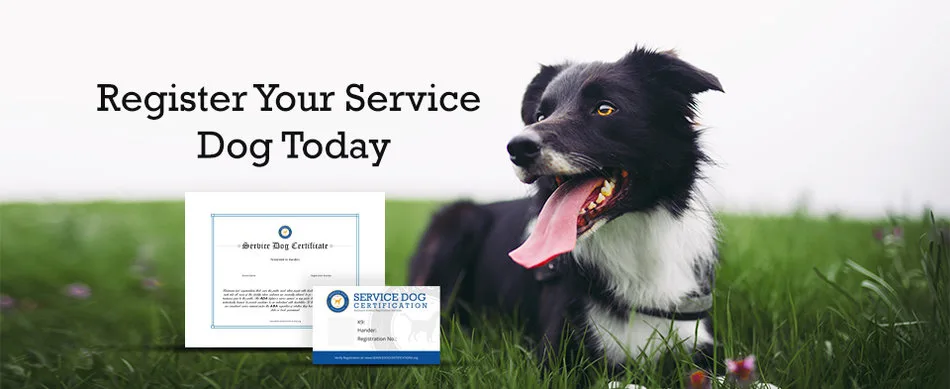How Can I Get My Dog to Be a Registered Service Dog?

Registering your service dog and getting a linked service dog ID card can help you get around public places that don’t allow dogs, but keep in mind that these are not legal requirements.
Here are the four steps to register a service dog:
- Step 1 – Confirm you have a qualifying disability
To own a service dog, you must have a physical or mental health impairment that substantially limits a major life activity, like the ability to work, socialize, or go to school. A licensed healthcare professional can assess your condition and, for psychiatric issues, write a PSD letter.
- Step 2 – Train your service dog
A service dog must be individually trained to perform a task or job related to your disability. Here is a link to a training guide for service dogs.
- Step 3 – Take a public access test
A service dog must also be trained to perform its duties in public environments. Service dogs have public access rights, so they are expected to be well-behaved and under their handler’s control at all times. Service dog owners can test whether their dog is ready by taking a public access test.
- Step 4 – Register your service dog
After qualifying for a service dog, you can register your dog with Service Dog Certifications. You are not required to register your service dog, but most handlers like having identifiers like a service dog identification card linked to a registration, tags, or vests to clearly signal their dog is a service animal to avoid unnecessary confrontations.
Service Dog Overview: A service dog is a type of legally recognized assistance animal trained to perform specific tasks for people with physical or mental health impairments. The task(s) performed by the dog must be directly related to the person’s disability. These service dog tasks include opening doors, retrieving items, responding to an emergency situation, guiding the handler through busy crowds or traffic, and providing deep pressure therapy during mental health crises. Service dogs that help with mental, intellectual, sensory, or psychiatric health conditions are called psychiatric service dogs.
Share this image on your site
Why You Should Register Your Service Dog
Registering your service dog enters your service dog into a searchable database, allowing a person to look up your service dog. You can register your service dog in our registry and get an ID card linked to your unique registration number.
Registrations, certifications, ID cards, tags, and vests all fall under the category of service dog paraphernalia. The main reason service dog handlers use registries, certifications, ID cards, tags, and vests is for ease of public access. Service dogs have the right to enter most public places normally closed to pets. In these places, it’s helpful for staff members and other patrons to have a quick and easy way to identify your dog as a service dog so there are no misunderstandings.
In addition, while third parties are not allowed to demand documents like ID cards and certificates, service dog handlers can attest that people frequently do so anyway. Whether at a store, an airport, a library, or a restaurant, service dog handlers are frequently harassed for service dog identification documents. Rather than engage in a lengthy legal conversation with every passerby, service dog handlers simply opt to have these accessories handy for convenience.
Obtaining a registration ID for your service dog is a painless way to peacefully go about your day in public while minimizing intrusive inquiries.
Why You Shouldn’t Register Your Service Dog
Here are some reasons NOT to register your service dog:
- Don’t register your service dog if you haven’t fully qualified for a service dog. For example, if you have not yet confirmed you have a qualifying disability or fully trained your service dog, you cannot register your service dog.
- Don’t register your service dog solely if you think it’s legally required. There are many good reasons to register your service dog, but it is not mandatory.
- Never register a service dog as a shortcut. A service dog handler is always responsible for verbally self-certifying that their dog is fully qualified as a service animal, and registration cannot get around that responsibility.
Final thoughts
If you are considering registering your service dog, go with Service Dog Certifications. We keep a database of service dogs for handlers who have chosen to register their dog.
We are a leading provider to responsible service dog handlers who need service dog accessories to avoid public confrontations and hassle. Service dog handlers nationwide trust us when purchasing service dog accessories because of our reliability and compliance with service dog standards.
About the Author: The writing team at Service Dog Certifications is made up of folks who really know their stuff when it comes to disability laws and assistance animals. Many of our writers and editors have service dogs themselves and share insights from their own experiences. All of us have a passion for disability rights and animals.
Latest Posts

Dangerous Materials Hiding in Your Dog Products
Jake’s German Shepherd began developing strange rashes around his collar. Three vet visits later, they figured out the leather was treated with chromium — a chemical that irritates sensitive skin. Jake had no idea his dog’s collar contained industrial chemicals. Most dog owners don’t know what goes into the products they buy. Many companies use […]

Read More

Can You Bring a Service Dog to a Basketball Game?
Yes, you absolutely can bring your service dog to basketball games. Whether you’re heading to your local high school tournament, a packed college rivalry game, or splurging on NBA tickets, the Americans with Disabilities Act protects your right to be accompanied by your service dog anywhere the public can go. When you arrive, venue employees […]

Read More

Best Pet Health Insurance Providers
If you own a pet, you know how important — and expensive — vet care can be. One way to offset those costs is to purchase pet health insurance. Like typical health insurance, pet insurance is available at many price points, and can cover all, most, or only some of your vet-related costs. It can […]

Read More


